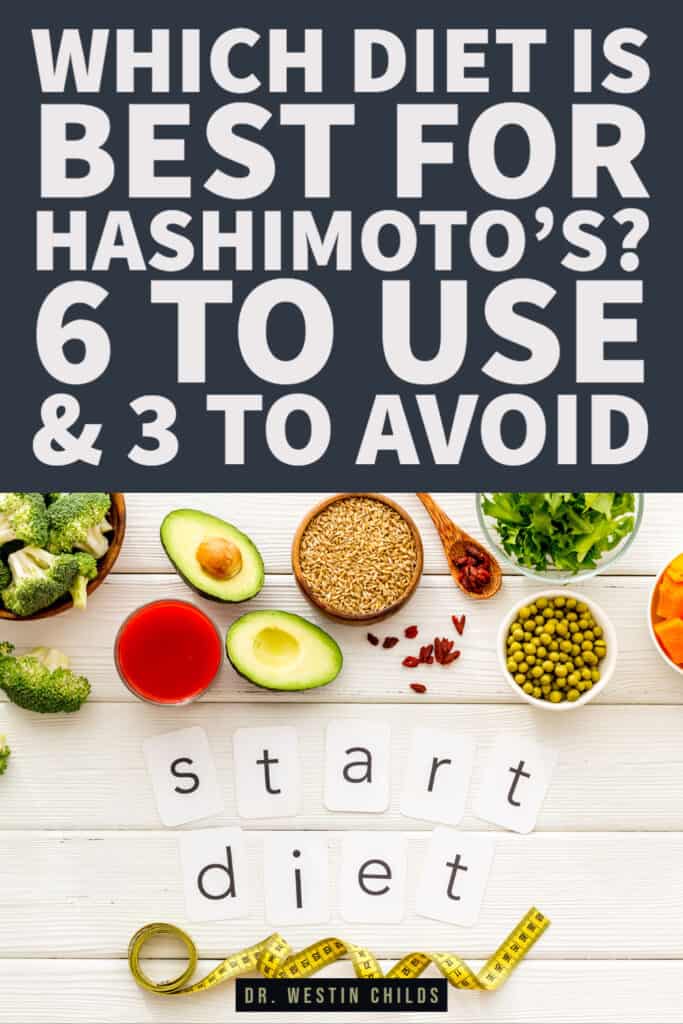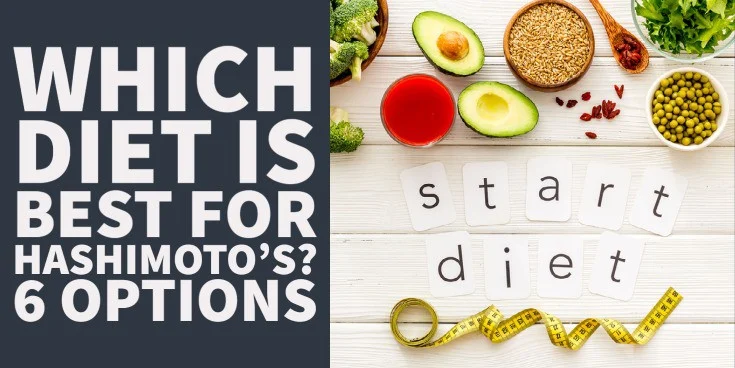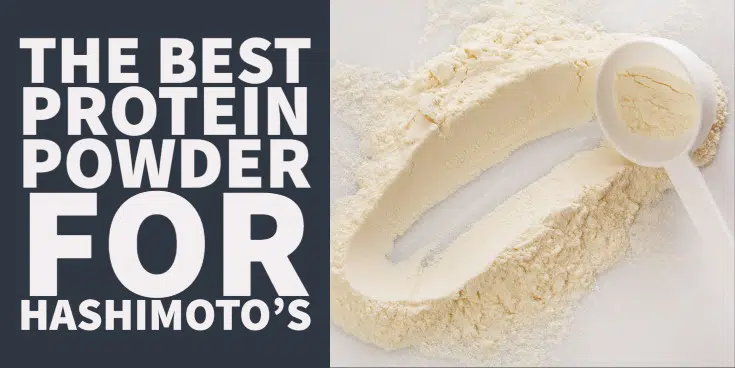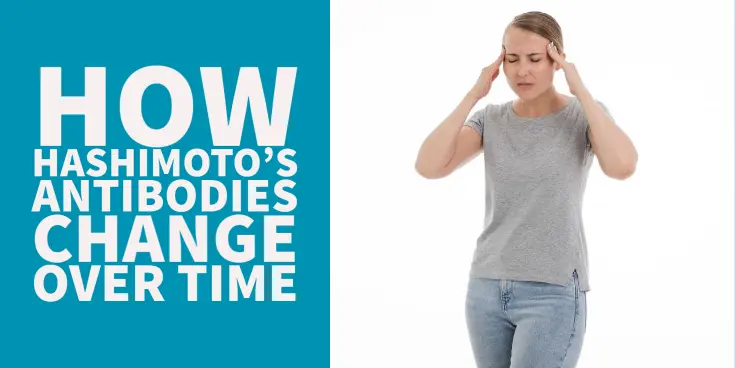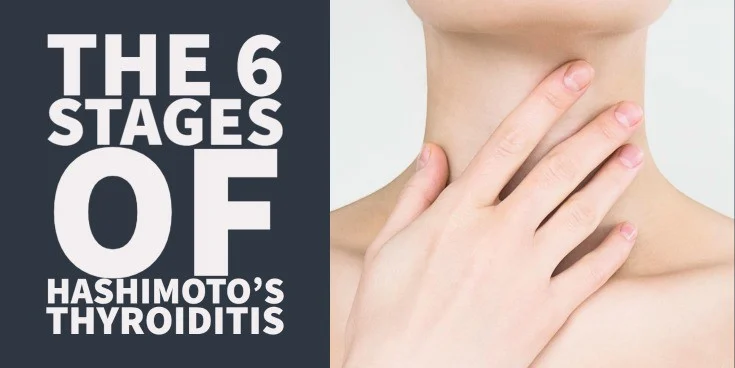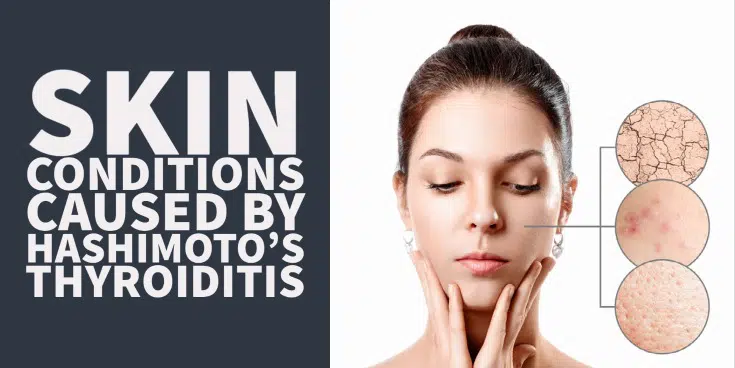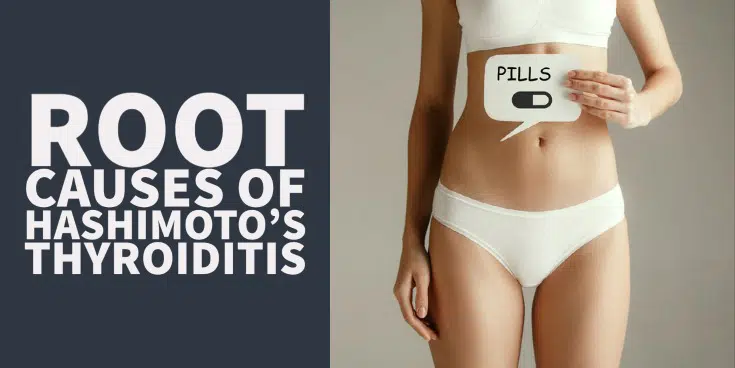If you’ve ever been confused about what to eat because of your Hashimoto’s then this is the article for you.
I’m going to take away the guessing game that is your diet…
Reduce your stress about what foods you should be eating and what foods you should be avoiding…
So that you can get back to what’s important:
Healing your autoimmune disease.
This article is going to go over how you should be approaching your diet after your diagnosis of Hashimoto’s.
And here’s the thing:
There is no one-size-fits-all diet that you should be following!
Everyone is completely different and that means the diet you need is not the same as your friends or someone in your support group.
This article will teach you everything you need to know to get started and feel confident you are on the right track…
So let’s jump in:
#1. Food Sensitivity Diet (Elimination Diet)
The Elimination diet is based on the idea that certain foods may cause negative reactions in certain people.
In the most basic sense, you simply remove these foods from your diet and then monitor how you feel.
Pretty simple, right?
There are two ways to do this diet:
The first is with blood testing for food sensitivities: Find specific foods that you are sensitive to using delayed IgG food sensitivity testing. Testing for IgG antibodies will find food *sensitivities* that you may be reacting to, but may not be allergic to. You can find more information in the video below:
When most people think of food allergies they think of allergies to foods like shellfish and tree nuts which may cause swelling of the face and airways leading to potentially life-threatening situations.
We aren’t talking about food allergies like these.
Instead, we are talking about sensitivities to certain foods that may make you react with low-grade inflammation, changes in colonic bacteria, depression, anxiety, mood disorders, acne, postnasal drip, and so on.
This type of food “allergy” is mediated by a different type of immunoglobulin known as IgG.
And the foods that trigger this reaction are more difficult to spot compared to those that cause anaphylaxis.
Why?
Because your reaction to the food might be delayed by up to 48 hours AFTER eating the food you are sensitive to.
This delayed reaction makes it difficult to put your finger on which foods may be causing you problems and can get really frustrating.
Delayed IgG food sensitivity testing can be very helpful for patients who don’t respond to the traditional elimination diet that simply removes the most common food allergies from the diet.
The second is to eliminate foods systematically: Instead of getting the delayed IgG blood test, you can simply remove the major food groups that most people are sensitive to for 30-90 days.
This allows enough time for the inflammation to cool down, your GI tract to begin healing, and for most of the other symptoms, you may be experiencing to resolve.
Once you’ve eliminated your symptoms (and only if you have eliminated your symptoms) you can then begin to slowly reintroduce these food groups back into your body while monitoring how you react.

If you find that you feel poorly after reintroducing certain foods back into your diet then you have some great information:
Stop eating the food that makes you feel terrible!
I’ve found that this type of diet can be difficult for patients who like things to be black and white.
Sometimes people just don’t want to give up their favorite foods even if they react poorly to them, so if you fall into this category it may be a good idea to just get the food sensitivity test to see which foods you need to avoid.
The most common food groups removed from this diet include gluten, dairy, soy, sugar, artificial sweeteners, corn, peanuts, eggs, and shellfish.

If you elect to go this route (without the blood testing), then it’s best to remove at least the top 5-7 most common food allergens.
You don’t want to remove too many foods initially because that can make dietary choices very difficult and doesn’t always lead to long-term success.
You can find an example below of the various phases of the elimination diet:
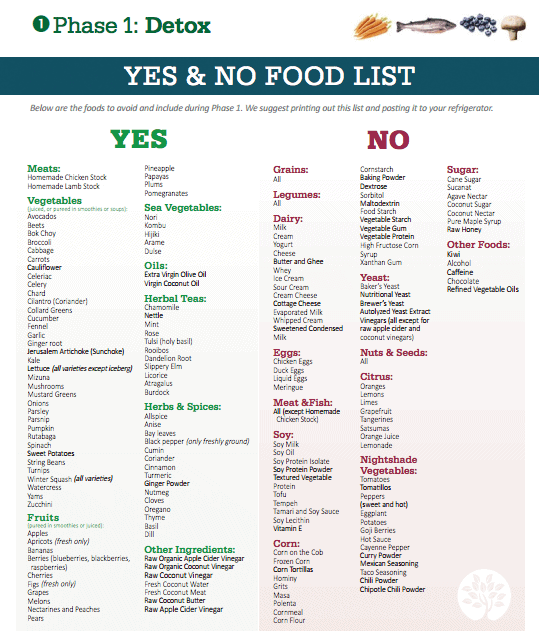
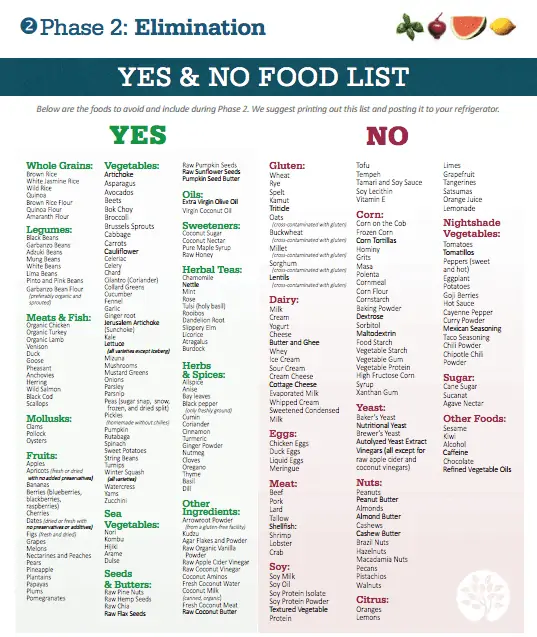
Does it work?
Yes!
The combination of going gluten, dairy, and soy-free, plus removing any foods you may be sensitive to by checking your delayed IgG antibodies, is one of the most effective methods for determining which diet your body needs.
In order for this diet to be effective just remember that you need to stick to it for at least 2-3 months.
According to a group study using this diet, 62% of people reported that they felt better, 4.2% said they felt worse, and 43% had a reduction in Hashimoto’s antibodies.
More information:
PROS
- The elimination diet had the highest reduction in antibodies of the diets in the survey.
- Easy implementation (it’s not hard to start and there are plenty of free resources to help guide you).
- You don’t necessarily need to see a nutritionist to start (though you can if you’d like extra help).
- A moderate percentage of people felt better on this diet.
- It can be cost-effective if you do not get delayed IgG food allergy testing (in other words, you don’t need to spend a lot of money on testing).
CONS
- The highest percentage of people felt WORSE on this diet.
- Testing can be expensive and, at times, inaccurate.
- Requires a lot of time to reintroduce food groups and you must stick to a schedule if you want it to work.
- May take weeks to months to feel better as you figure out which foods you should avoid.
Who Should Consider the Elimination Diet?
- People who react with itching, swelling, hives, runny nose, or post-nasal drip after eating certain foods
- People who also have a personal history of Asthma or Eczema
- People who have failed other more basic diets like Gluten-free, soy-free, or grain-free and are still symptomatic or still have high levels of antibodies
- Quick Tip: You don’t necessarily need to have delayed IgG sensitivity testing to get started. It may be necessary for some people but you can get started right away by eliminating the 7 most common reactive foods (listed above).
#2. Autoimmune Paleo Diet (AIP)
Also referred to as the autoimmune protocol or autoimmune diet, this diet is very similar to the paleo diet except it also excludes nuts, seeds, eggs, legumes, and nightshades.
The AIP diet is felt to be one of the best diets to reduce antibody levels in Hashimoto’s (and other autoimmune diseases) but it is also one of the most restrictive diets out there making it difficult to sustain for long periods of time.
To see a case study of one of my patients using AIP to lose weight and feel better please see this post.
Since this is really just a modified version (which is already fairly restrictive), you may be wondering what is left to eat if you further restrict the foods that you can eat.
You can see the list of the allowed foods below:
- Vegetables (Except Nightshades)
- Fruits
- Coconut Products
- Fats: Olive oil, Coconut oil, Lard
- Fermented Foods
- Bone Broth
- Grass Fed Meats, Poultry, and Seafood
- Non-seed Herbal Teas and Green Tea
- Vinegar (Including Balsamic without added sugar)
- 1 Tsp of Maple Syrup and Honey used as sweeteners
- All fresh non-seed Herbs
- Grass Fed Gelatin and Arrowroot Starch
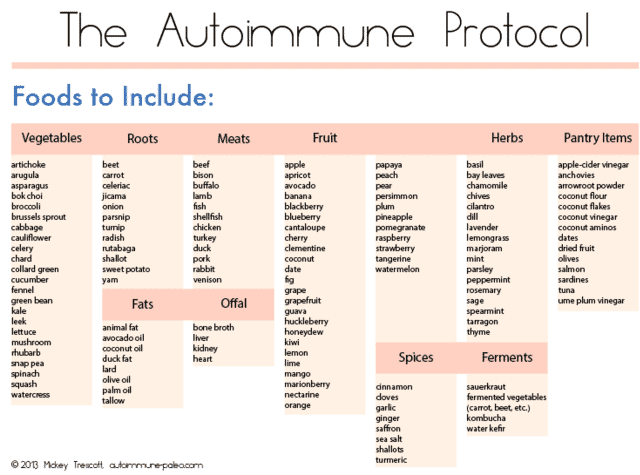
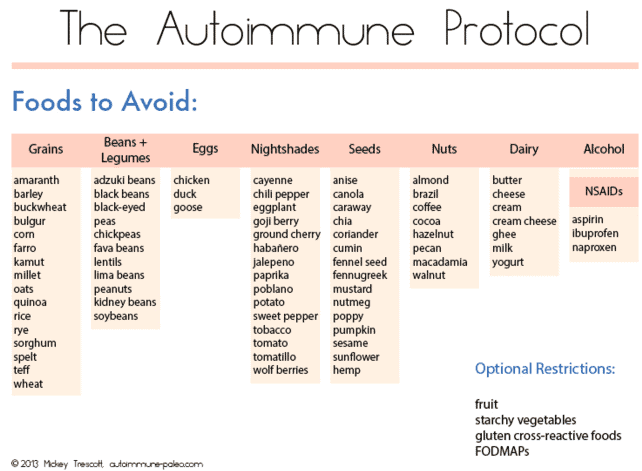
Does it work?
As long as you can sustain this diet it has the highest potential to help reduce antibody levels and improve symptoms.
One of the problems with the AIP diet is how restrictive it is which can lead to a lack of compliance in many patients.
In other words, many thyroid patients start this diet with good intentions but fail to continue using it long enough to see results.
According to group data, 75% of people felt better, 4% of people felt worse, and 43% had a reduction in antibodies while following the auto-Immune paleo diet.
PROS
- A moderate percentage of people felt better on this diet.
- Many patients report feeling better very quickly.
- Includes gut-healing foods like bone broths.
- Good support community online.
- Easy access to recipes online.
CONS
- A high percentage of people felt WORSE on this diet.
- Lots of restrictions initially, making compliance difficult.
- Requires a lot of time to reintroduce food groups after phase 1.
- Patients may start reacting to foods they didn’t react to previously which may lead them down a path of ever restricting their food choices.
Who should consider the Autoimmune Paleo Diet?
- People who have multiple autoimmune conditions (in addition to Hashimoto’s), multiple food sensitivities, and multiple medical problems
- People who have failed other less restrictive diets (gluten-free, paleo, dairy free, etc.)
- People who want to jump to the “best diet” and are willing to make drastic changes to their diet
- Quick Tip: I don’t typically recommend that all Hashimoto’s patients start with this diet because for many patients less restrictive diets are enough to lower antibody levels and improve symptoms, if you fit into the categories above I would strongly consider AIP to start.
#3. Gluten-Free Diet
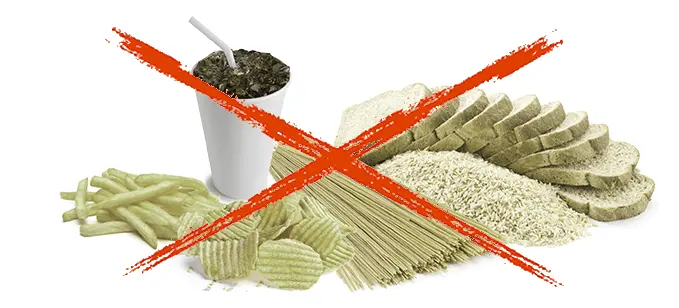
If you don’t already know about gluten here is a quick primer:
Gluten is a name used to define multiple proteins found in wheat, rye, and barley. There are two varieties of problems that people can experience from exposure to gluten, both of which cause problems for the immune system and the gut:
The first is Celiac disease:
People with this condition have an autoimmune response when introduced to the gluten protein which results in damage to the intestines, inflammation, and many other extra-intestinal signs and symptoms.
Diagnosing Celiac disease is not very difficult because patients with this condition typically have elevated blood levels of gliadin, transglutaminase-2, and endomysium which you can find on testing.
When present, Celiac disease results in damage to the intestinal wall as your immune system attacks the gluten protein as if it’s a foreign invader.
This damage leads to increased intestinal permeability (“leaky gut”) and a variety of symptoms including an increased risk of developing autoimmune diseases (2) like Hashimoto’s thyroiditis.
This process happens through several mechanisms including molecular mimicry (3).
In essence, as your intestinal wall gets damaged it lets in portions of undigested proteins, food particles, and bacteria to which your body creates antibodies.
These antibodies can then cross-react with other tissues resulting in damage and autoimmune disease.
Obviously, this is not something you want going on in your body which is why treating Celiac disease by going gluten-free is so important.
Even if you don’t have Celiac disease you can still experience problems with gluten.
When this happens, it’s called gluten sensitivity (the official name is non-Celiac gluten sensitivity or NCGS for short).
Originally, many providers didn’t think this condition existed but it turns out it does and its existence is supported by plenty of data… (4)
Non-celiac gluten sensitivity:
People with this condition react negatively to gluten, much like those with Celiac disease, but the symptoms and pathophysiology are slightly different between the two.
For starters, traditional blood tests for gluten antibodies are all negative (5) which means it’s more difficult to diagnose.
These negative blood tests can also lull some patients into falsely believing that gluten isn’t a problem for them when it still is.
Just because you have negative antibodies to gluten doesn’t mean gluten isn’t a problem for you.
For those people with gluten intolerance, non-celiac gluten sensitivity still causes plenty of problems both in the intestinal tract and outside of the intestinal tract and that’s one of the ways that some experts recommend diagnosing the condition:

- Intestinal symptoms: Bloating, abdominal pain, diarrhea, epigastric pain, nausea, gas, acid reflux, IBS-like symptoms, and constipation
- Extraintestinal symptoms: Fatigue, headaches, anxiety and other mood changes, brain fog, numbness/tingling, joint and muscle pain, and skin changes including rashes or random outbreaks
Do you have any of these symptoms but negative blood tests for Celiac disease?
Or have you removed gluten in the past and felt better when you did? Only to find out that your symptoms return when you start eating it again?
If so then you might have non-celiac gluten sensitivity (6).
In addition to the symptoms listed above, NCGS can also cause increased inflammation and increased intestinal permeability, just like Celiac disease, leading to much of the same increased risk of developing autoimmune diseases.
For this reason, (and many others) it may be smart to avoid gluten altogether if you have Hashimoto’s whether you have been officially diagnosed with either Celiac disease or non-Celiac gluten sensitivity.
Sometimes it’s better to err on the side of caution and probability.
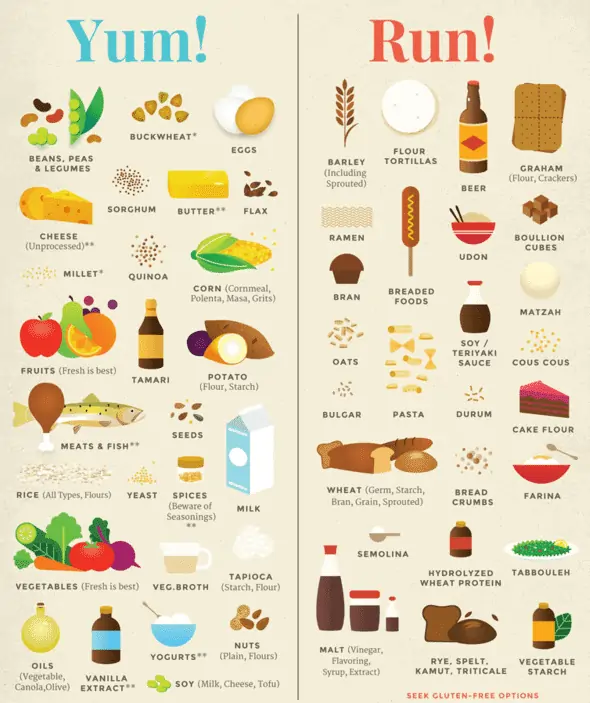
Does it work?
Going gluten-free will usually result in SOME improvement in symptoms (7) for most patients with Hashimoto’s. In my experience, up to 80% of patients with Hashimoto’s have some improvement (as defined by a reduction in thyroid symptoms, thyroid antibodies, or some combination of the two) when going gluten-free.
In order to see success with the gluten-free diet, you must avoid all sources of gluten.
This is trickier than it seems as gluten is often hiding in all sorts of foods, sauces, condiments, and even some cosmetics.
I’ve been gluten-free for 9 years but when I first went started I continued to find small sources of contamination in food products and condiments months down the road.
According to group data 88% of people felt better on this diet, ~1% of people felt worse, and 33% of people had a reduction in antibodies.
More information:
PROS
- The highest percentage of people felt better when going gluten-free.
- There’s lots of free information, how-to guides, recipes, and meal plans available online.
- It’s easy to get started right away (just go into your pantry and start throwing away foods that contain gluten).
- There’s a great support community online including Facebook groups, bloggers, health coaches, and more.
CONS
- It can be difficult to remove ALL sources of gluten from your diet.
- There is lots of gluten-free junk food available (it’s easy to eat an unhealthy gluten-free diet).
- Going gluten-free can help but often you may need more restrictive diets to see the improvement you are looking for.
Who should consider the Gluten-Free diet?
- All patients with Hashimoto’s (going gluten-free for 3 months should be standard for any newly diagnosed Hashimoto’s patient).
- Patients with a family history of Celiac disease, Hashimoto’s, or other thyroid problems.
- People who have chronic migraines, chronic headaches, acne, or multiple gastrointestinal symptoms.
- Quick Tip: Most people benefit from going gluten-free (even if you decide on a different diet you should still ALSO be gluten-free for 3 months). Don’t fall into the trap of thinking that if you have negative antibodies to gluten you are fine to eat it. Most patients with Hashimoto’s do much better cutting out gluten.
#4. Paleo Diet
The paleo diet is another very popular diet, and for good reason.
It consists of real whole food that attempts to mimic the diet of the paleolithic man/woman which automatically removes inflammatory industrial seed oils, GMO food products, refined grains, added sugar, and generally most foods you shouldn’t put into your body.
Here’s a brief graphic outlining what you can and can’t eat on the paleo diet:
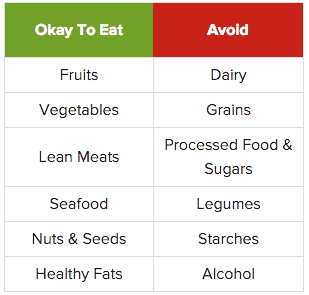
From a macromolecule perspective, the paleo diet tends to be higher in healthy fats with moderate amounts of protein and generally small amounts of carbohydrates.
One of the dangers of going paleo is actually reducing your carbohydrates too much because the most common sources of carbs are generally forbidden.
While reducing the number of carbohydrates can be good in certain medical conditions (leptin and insulin resistance, for instance), reducing all sources of carbohydrates can result in worsening fatigue in some patients with Hashimoto’s.
Another potential pitfall of eating a paleo-based diet is consuming too much protein.
High levels of protein can activate the mTOR pathway (8) and influence leptin levels leading to worsening leptin resistance and inflammation (9).
As long as healthy fats, proteins, and carbs are balanced the diet is excellent, but it does require some manipulation and personalization on your part to get there.
Does it work?
I’m a big fan of pretty much any whole food-based diet and would routinely start my patients on modified versions of the paleo diet and then further manipulate and refine their macromolecules based on their symptoms and lab tests.
The paleo diet is a great starting point because there is plenty of information including recipes and diet guides available on the internet to help you get started.
And because this diet automatically removes most unhealthy foods, even if it’s not perfect for you, you should see some improvement.
In addition to these benefits, according to group data 81% of people felt better, 3.2% of people felt worse, and 27% of people had a reduction in antibodies after adopting the paleo diet.
More information:
PROS
- A large percentage of people felt better on this diet.
- There’s lots of free information, guides, recipes, and meal plans available online to help beginners.
- There’s a great paleo community online that can offer help, advice, and personal experience.
- There is a lot of research backing the health claims.
CONS
- The standard paleo diet is low in carbohydrates which may lead some people to experience fatigue and may exacerbate existing conditions such as adrenal fatigue.
- Some people can have problems maintaining body weight due to a lower amount of carbs.
- It may be too restrictive for certain individuals which means compliance may be an issue.
Who should consider the Paleo Diet?
- People who have tried going gluten-free but still have room for improvement in their symptoms.
- People with any of the following: acne, depression, anxiety, fatigue, eczema, environmental/seasonal allergies, post nasal drip, IBS/IBD, GERD, chronic constipation.
- For people who are unsure of what diet is best for them, this is a GREAT place to start.
- Quick Tip: The Paleo diet is great to start with because of the supportive online communities that exist. Be careful when switching to this diet if you rely heavily on healthy sources of carbs for energy – sometimes switching to low-carb diets can make patients with Hashimoto’s worse.
#5. Low FODMAP’s Diet
What in the world are FODMAPs? I’m glad you asked…
It’s an acronym that stands for Fermentable Oligo-Di-Monosaccharides And Polyols.
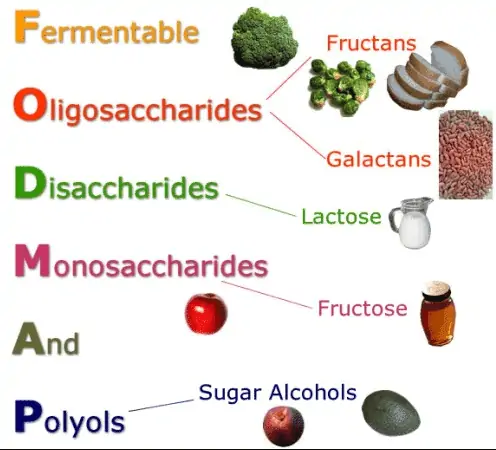
It’s really just a fancy name to describe a class of sugars and carbohydrates that are found in certain foods. FODMAPs have been known to cause gastrointestinal issues like gas, bloating, cramping, and irritable bowel like symptoms (10) in certain groups of people.
For instance, those who have SIBO, or candida overgrowth, appear to be particularly sensitive to FODMAPs and react poorly when eating them (11).
This diet is included here because a large percentage of patients with hypothyroidism (and by extension, Hashimoto’s) suffer from SIBO and/or fungal overgrowth syndromes.
As a result, many thyroid patients stand to benefit from this type of diet whether they realize it or not.
The low FODMAPs diet works by eliminating foods that are high in these types of carbohydrates:
- Fructose (fruits, honey, high fructose corn syrup)
- Lactose (dairy products)
- Fructans (wheat, garlic, onion, inulin)
- Galactans (beans, lentils, soybeans)
- Polyols (Sweeteners like xylitol and mannitol, along with stone fruits such as Avocado)
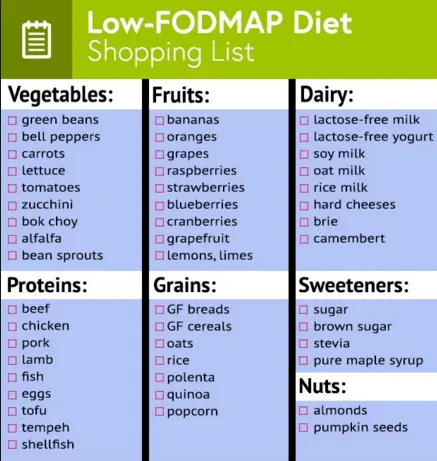
Does it work?
This is definitely a specialty type of diet and not one that I would regularly recommend to the average patient with Hashimoto’s.
In most cases simply removing the primary sources of carbohydrates like bread, pasta, gluten-containing starches, etc. is enough to significantly improve any GI-related issues.
A minority of patients will require the complete removal of FODMAPs especially if they have constipation-predominant IBS or treatment-refractory SIBO.
Otherwise, most patients should stick to the other diets listed above as a starting point (unless otherwise directed by their doctor).
According to the group data, 39% of people felt better, 0% of people felt worse, and 27% of people had reduced antibodies while following this diet.
More information:
PROS
- Up to 50% of patients with thyroid disease also have SIBO which means this diet may help with both gut function as well as thyroid function.
- It may also help treat candida overgrowth and other fungal overgrowth syndromes.
- It’s a great diet and option for those suffering from irritable bowel syndrome or other difficult-to-treat gut problems.
- Very few patients feel worse when using this diet.
CONS
- Those using this diet saw a minor reduction in antibodies out of all diets surveyed.
- It doesn’t automatically exclude gluten which can be problematic for some people (you may need further restrictions to feel better).
- The smallest number of patients felt better on this diet when surveyed.
Who should consider the Low FODMAPs Diet?
- People who have Hashimoto’s and have been diagnosed with (or have symptoms of) small intestinal bacterial overgrowth (SIBO for short) and/or yeast or candida overgrowth.
- People who still have gas/bloating despite adopting a paleo or gluten-free diet.
- People who have failed less restrictive diets.
- Quick Tip: This diet may be effective for patients suffering from chronic gas/bloating, abdominal distention, or extreme chronic constipation (1 bowel movement every 4-7 days). If you have these symptoms there is a very high chance you are suffering from SIBO and/or yeast overgrowth.
#6. The Carnivore Diet
The carnivore diet is kind of the new kid on the block and has really come into prominence over the last couple of years.
There are plenty of case studies from patients with all sorts of medical conditions and autoimmune diseases (including Hashimoto’s) who have seen almost complete resolution in their condition using the carnivore diet.
I have tried it personally and have recommended it to some patients with varying degrees of success.
If you haven’t heard of the carnivore diet, here are the basics.
As the name implies, the carnivore diet allows you to eat meats, dairy, water, coffee, tea, bone broth, and nothing else.
Why does it work so well?
Probably because following it removes most, if not all, of the foods that people typically react to including things like gluten, FODMAPs, lectins, carbohydrates, and so on.
In this way, you can think of it as an extreme type of elimination diet.
Even though it does show promise, there are still some reasons to be cautious before using it.
One of those is safety data.
We just don’t have a lot of long-term studies to know whether it is safe to go carnivore for indefinite lengths of time.
My suspicion is that it’s probably safe for some people, but not for others, and, as a result, I typically reserve recommending this diet when other more conventional diets have failed.
More information:
PROS
- If don’t correctly, you will be consuming some of the most nutrient-dense foods available.
- It can be considered as a way to force an elimination diet because foods that cause issues are necessarily excluded.
- It automatically excludes FODMAPs, oxalates, lectins, sulfites, salicylates, phytates, and fiber.
- Can dramatically improve gut health in some people.
- May also help with weight loss.
CONS
- The long-term safety data for this diet is lacking. It’s hard to know if this is something that can be safely used for an indefinite amount of time.
- It’s not ideal for those who
- It may not provide enough carbohydrates for certain individuals (especially those with adrenal fatigue).
- Some studies indicate there may be a connection between meat consumption and autoimmune disease (theoretically, large consumption of meat may make Hashimoto’s worse).
Who should consider the carnivore diet?
- Those who have failed less restrictive diets.
- Thyroid patients who tolerate meat, eggs, and dairy products.
- Patients with a history of multiple autoimmune diseases.
- Patients with a history of gut issues/problems.
Diets To Avoid with Hashimoto’s
Having gone through diets that are beneficial to people with Hashimoto’s we should also go over some diets that you should avoid if you have this condition:
#1. Calorie Restricted Diets
Have you been told to eat less and exercise more? If so, whoever told you that was recommending a calorie-restricted diet and this is probably one of the worst things you can do for your thyroid health.
Aside from the fact that calorie-restricted diets don’t work for weight loss, they can also be incredibly harmful to your thyroid as well.
We know from studies that as few as 25 days of a calorie-restriction is enough to reduce thyroid function and T4 to T3 conversion (14) by up to 50%.
Put into more easily understandable terms, calorie-restricted diets reduce how much thyroid hormone your thyroid gland produces and may make your hypothyroid symptoms worse.
This is confusing for some patients because these types of diets can sometimes work in the short term.
But even though they may help you lose weight temporarily, they never work long-term.
Those who lose weight by restricting their calories will always find that after about 6-12 months that whatever weight they lost eventually comes back, usually due to the thyroid problems we just discussed.
Whatever you do, do NOT use a calorie-restricted diet if you have Hashimoto’s. You will only make your thyroid function worse and it will ultimately lead to more weight gain down the road.
If weight loss is your primary goal then you need to focus on your hormones including your thyroid as well as insulin, leptin, cortisol, estrogen, progesterone, and testosterone.
Balancing these hormones will give you the long-term weight loss you are looking for.
#2. Weight Loss Diets Full of Processed Foods
This one is kind of an extension of #2 but it’s worth discussing here as well.
What do I mean by weight loss diets full of processed foods?
I’m talking about those weight loss programs that provide you with pre-made processed meal plans that are supposed to make weight loss “effortless”.
I’m not going to name any names here, but I think you can think of a few businesses that provide these meals.
Not only are these meals processed (which means they are often filled with inflammatory ingredients and preservatives that may cause gut problems, and inflammation, and make your thyroid worse), but they also are designed to have minimal calories as well.
This means you are getting the worst of both worlds:
Processed foods and a calorie-restricted diet at the same time.
Consuming pre-made meals also does nothing for your long-term success because it doesn’t teach you how to cook, how to plan your own meals, and how to figure out what works for your body.
These skills are necessary if you want to have long-term success with your diet and your Hashimoto’s.
Final thoughts
While the topic of diet can definitely be complex, don’t let it become so overwhelming that you become paralyzed.
If you aren’t sure where to start then just start with some baby steps.
Simple things like removing gluten, eating whole foods, and avoiding processed foods can go a long way to improving Hashimoto’s.
If you are feeling more comfortable then go ahead and jump in with both feet to some of the diets mentioned here.
One thing I would caution against, though:
Don’t fall into the trap that if a certain diet worked for someone else that it will work for you.
Every single one of us is different.
Just like we all look different on the outside, on the inside we all have different needs.
And remember, if you have any questions or concerns about your health make sure to talk to a qualified and knowledgeable practitioner!
Now I want to hear from you:
Were you aware of all of these diets before you read this article?
Did any diets stand out to you personally?
Have you tried any of these diets before? Did they work for you?
What type of diet are you currently eating and is it helping or hurting your Hashimoto’s?
Leave your questions or comments below!
Scientific References
#1. http://www.ncbi.nlm.nih.gov/pubmed/15650357
#2. https://www.ncbi.nlm.nih.gov/pmc/articles/PMC3741914/
#3. https://www.ncbi.nlm.nih.gov/pubmed/7828371
#4. https://www.ncbi.nlm.nih.gov/pubmed/24533607
#5. https://www.ncbi.nlm.nih.gov/pmc/articles/PMC4488826/
#6. https://www.ncbi.nlm.nih.gov/pmc/articles/PMC4406911/
#7. https://www.ncbi.nlm.nih.gov/pubmed/28315909
#8. https://www.ncbi.nlm.nih.gov/pmc/articles/PMC4977908/
#9. https://www.ncbi.nlm.nih.gov/pubmed/18583936
#10. https://www.ncbi.nlm.nih.gov/pmc/articles/PMC5390324/
#11. https://www.ncbi.nlm.nih.gov/pmc/articles/PMC3966170/
#12. https://www.ncbi.nlm.nih.gov/pmc/articles/PMC3109527/
#13. https://www.ncbi.nlm.nih.gov/pmc/articles/PMC4742721/
#14. http://www.ncbi.nlm.nih.gov/pubmed/19208852
#15. https://www.ncbi.nlm.nih.gov/pubmed/17967708
#16. https://www.ncbi.nlm.nih.gov/pubmed/26369574
#17. https://www.ncbi.nlm.nih.gov/pmc/articles/PMC5725446/
#18. https://www.ncbi.nlm.nih.gov/pmc/articles/PMC5371748/
#19. https://www.ncbi.nlm.nih.gov/pmc/articles/PMC2833301/
#20. https://www.ncbi.nlm.nih.gov/pmc/articles/PMC1411539/
#21. https://www.ncbi.nlm.nih.gov/pubmed/2464986
#22. <a href=”https://www.ncbi.nlm.nih.gov/pubmed/6694559″
